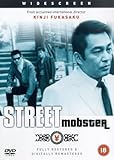Eye For Film >> Movies >> Street Mobster (1972) Film Review
Street Mobster
Reviewed by: David Stanners
In the opening scene of Kinji Fukasawa's Street Mobster, protagonist and top boy Isamu (Bunta Sugawara) says, "I like fighting and girls, but not gambling." This is pretty much the film in a nutshell.
Without beating about the bush, Isamu sets forth his doomed fate from the outset: his birthday is on the day Japan lost the war; he is fatherless, from a broken home, with an alcoholic mother who drowned in a river. After reform school, he moved into gangs, abused and raped women and fought a lot, before taking a share in a local brothel. Having done a stretch in prison for attacking the ruling Takigawa gang, he is out and about, looking for action. Stumbling upon the girl he once raped and sold to the brothel, she follows him around town in a cyclical bout of fatal desire.
Meanwhile, the word on the street is that the Takigawa gang has gone corporate and is ruled by a small business elite, now in stiff competition with the rival Yato gang. Quiet on the work front, Isamu decides, with the help of a few friends, to drive a wedge between the two rivals and carve out a little respect for himself and the expendable street kids the bosses have used and abandoned.
You could argue that Street Mobster is part of Fukasaku's long-term social critique against the hypocrisy of post-war Japan, a period in which economic growth for the few meant poverty and crime for many. Fukusawa apparently set many of his stories in the Sixties and Seventies against the backdrop of ruined cities, slums and black market trading. A reality the government was keen to ignore.
Certain similarities could be drawn to Scorsese's early career, with the streetwise punks in Mean Streets bearing similar resemblance to those of the Tokyo side streets. But that's about as far as the similarities go. Street Mobster is sorely lacking in coherence and narrative. While the performances are okay, a lot of the time it's hard to know who's fighting whom, and for what. Half way through, another mob come into play, called the Salei gang, but little is known of them and the story goes to pot.
The inevitability of its ending is acceptable and the unrestrained grittiness with which Fukusawa tackles his subject is commendable. Hand held cameras bolster the violence and sense of mayhem, but ultimately this is probably one of his lesser efforts.
Fair intentions find laboured results.
Reviewed on: 02 Feb 2005



















